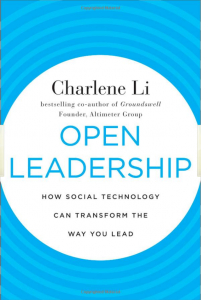 Charlene Li's new book will be out in a few weeks, and if you're interested in how social media is transforming the way business gets done, you'll want to pick up a copy.
Charlene Li's new book will be out in a few weeks, and if you're interested in how social media is transforming the way business gets done, you'll want to pick up a copy.The book is called Open Leadership, and I would classify it as the first of the post-social media books. By that I mean that it looks at the consequences of democratized communications rather than at the media itself. Expect to see a wave of similar books in the coming years. This is a very good first entry.
Open Leadership will make a lot of people uncomfortable because it proposes that the only way to govern effectively in a transparent business world is to give up control and trust people to do the right thing. Li makes a persuasive case by citing numerous examples of companies that have successfully done exactly that.
Li is a former Forrester Research analyst, founder of Altimeter Group and co-author of Groundswell, the breakthrough 2008 book that provided the first demographic profiles of social media users as well as a rigorous methodology for evaluating the ROI of social programs. In this book, she builds on some of the economic models first presented in Groundswell, but Open Leadership is more of a call to action than a financial exercise.
The premise is encapsulated in the title of Chapter 1: "Why Giving up Control Is Inevitable." Li asserts that today's business world is too complex and competitive to permit organizations to continue to manage the way they have since the Industrial Revolution. That top-down philosophy assumes that people are idiots who can't accomplish tasks without instructions, rigid rules and constant oversight. That worked okay when companies had some control over their environment, but today too many factors are out of their hands. So one man's story of how an airline broke his guitar and refused to fix it becomes a cultural sensation while the airline stands by helplessly and fumes.
 Li (left) asserts that the only way to gain any level of control over today's turbo-charged business environment is to give up as much control as possible. New business leaders set examples, demonstrate confidence and create cultures that tolerate intelligent, well-intentioned failure. And guess what? It turns out that when smart people are given the latitude to make decisions, they tend to make better ones than if someone else makes decisions for them.
Li (left) asserts that the only way to gain any level of control over today's turbo-charged business environment is to give up as much control as possible. New business leaders set examples, demonstrate confidence and create cultures that tolerate intelligent, well-intentioned failure. And guess what? It turns out that when smart people are given the latitude to make decisions, they tend to make better ones than if someone else makes decisions for them.
Open Leadership provides some refreshing new examples of how this new management philosophy is working:
- Meetup.com replaced a top-down approach to project management with one that requires stakeholders to persuade engineers to spend time on their projects. Productivity exploded;
- BestBuy outlasted competitors in the brutal electronics retailing business in part by developing a culture that lets its employees guide customers toward the best decision, even if that means buying from a competitor;
- Electronics distributor Premier Farnell distributed low-cost digital video cameras to every employee in the company so that they could document their best practices and share them on an internal network. Employees are more empowered and the quality of information is better.





No comments:
Post a Comment